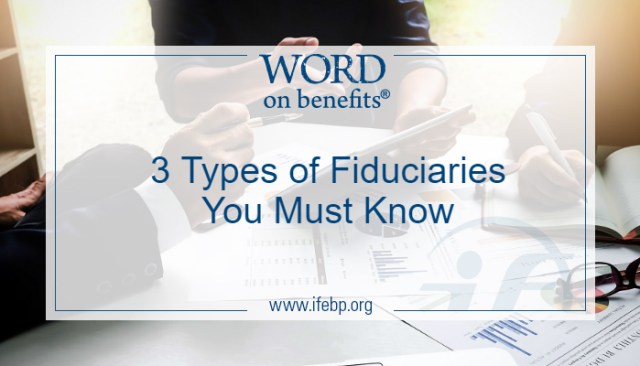
I recently provided information to some International Foundation members who asked about the different types of fiduciaries, and you might be wondering too.
Retirement plan fiduciaries manage the plan and its assets. The same five standards of conduct apply to all fiduciaries: act in the sole interest of plan participants and beneficiaries, use plan assets exclusively for paying benefits and defraying reasonable costs of administration, act prudently, diversify investments, and act in line with the plan document.
Who are all these fiduciaries?

First, let’s start with the difference between a named fiduciary and a functional fiduciary. ERISA requires the plan document to identify a named fiduciary who is ultimately responsible for the plan. (Generally for multiemployer plans, the named fiduciary is the board of trustees.) ERISA allows named fiduciaries to delegate fiduciary responsibilities to outside experts who are functional fiduciaries based on their actions. The plan document must allow delegation and provide a how-to procedure. If you’d like to know more, see Chapters 5 and 6 of the International Foundation Trustee Handbook.
ERISA defines three types of functional fiduciaries:
- 3(16) Plan Administrator—has discretionary responsibility for the administration of the plan, such as ERISA reporting and disclosure.
- Trustees are liable for investment decisions.
- 3(21) Investment Consultant—provides investment advice to trustees for a fee, and trustees make final decisions
- The investment consultant and trustees are jointly liable for investment decisions.
- 3(38) Investment Manager—has discretion over the management of the plan or control of its assets
- The investment manager assumes liability for investment decisions under written acknowledgment.
[Learn More: Certificate in ERISA Compliance | Earn Your Certificate Online]
Jennifer Mink explains in a Benefits Magazine article titled “Critical Questions to Ask When Hiring an Investment Manager” that one of the advantages of outsourcing is to enable trustees to fulfill their fiduciary duties even if they don’t have the expertise needed to comply with complex requirements.
Here are a few things to take away:
- The trustee’s role in outsourcing is to prudently select and monitor fiduciary service providers.
- Outsourcing does not release a trustee from all fiduciary responsibilities.
- Fiduciary outsourcing concerns are on the radar of the ERISA Advisory Council, which released a report in January 2015 recommending that the DOL release more guidance on this issue.
[Related Reading: Who Is an ERISA Fiduciary Now, and What Should One Be Doing?]
Jenny Lucey, GBA
Manager, Reference/Research Services at the International Foundation





